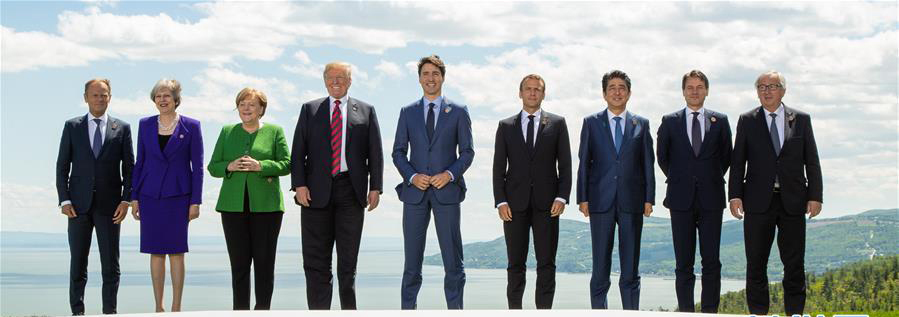G7 summit opens amid tariff disputes, tensions among allies

The 44th G7 Summit took place from June 8 to 9 in Charlevoix, a city in Quebec, Canada.(XINHUA)
From June 8 to 9, the G7 Summit took place in Charlevoix, a city in Quebec, Canada. One week prior, the United States announced it would impose steep tariffs on steel and aluminum from Canada, Mexico and the European Union. Trump’s move was immediately denounced by US allies, who retaliated with tariffs of their own. Would the G7 Summit be able to produce results despite tensions among members? Prior to the summit, a CSST reporter interviewed John Kirton, co-founder and director of the G7 Research Group at the Munk School of Global Affairs, University of Toronto.
“Without a doubt, trade will be a source of division at the summit,” Kirton said. “US steel and aluminum tariffs are a source of tension that risks dividing the G7 into a G6 versus 1.”
Canadian Prime Minister Justin Trudeau said it was “inconceivable” that Canada “could be considered a national security threat.”
Canada announced corresponding tariffs on a broad list of American exports, including steel and aluminum. The European Union has been preparing to levy tariffs against $7 billion worth of imported American products.
Given these disputes and potential sources of division, there will also be many opportunities for cooperation to look forward to. For example, there is an unprecedented focus on gender equality, which is a central theme of the summit, embedded into almost all other areas, Kirton said. He also noted that the summit is expected to raise significant funds to support girls’ education and women’s empowerment. The issue of security is also likely to be a key facet of this summit which requires a unified G7 response—and thus likely to encourage solidarity and cooperation among members.
Canada has introduced several initiatives aimed at achieving these priorities, Kirton said, including unprecedented consultations with civil society, expanded engagement groups, and a variety of invited guests.
When the G20 was established in 1999, observers predicted that the role of G7 might be diminished in the international arena, but Kirton disagreed. The inadequacy of multilateral organizations and agreements, like the UNSC, the Organization for the Prohibition of Chemical Weapons and Paris Accord, leaves a gap that needs to be filled by the G7, Kirton said.
The G20, on the other hand, brings its own unique perspective to the challenges of global governance, promoting a stronger voice from developing countries and emerging economies. The nature of these two organizations are different, so it is difficult for one to completely replace the other, Kirton said.
During an exclusive interview with NBC, Trudeau said that Canada and the United States are the most successful allies in the history of the modern world, and “they are always there for each other,” and “somehow, this is insulting.”
Trudeau was right to speak firmly and directly about the irrationality of Trump’s unilateral metal tariffs which will quickly do considerable damage to the United States, Kirton said.
In addition, Kirton said that Trump’s businessman-like tactics will add a degree of unpredictability to global governance. The US president is guided by an America first ideology and has made bold moves that challenge foundational arrangements and relationships in the Western world. In this sense, Trump’s presidency presents serious difficulties, especially in terms of the unity of the West, Kirton said.
FENG DAIMEI is a correspondent with Chinese Social Sciences Today.

 PRINT
PRINT CLOSE
CLOSE